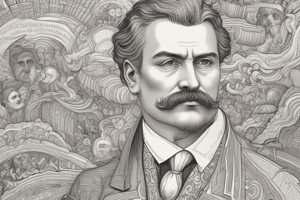Podcast
Questions and Answers
How does existentialism, particularly through the concept of 'existence precedes essence,' challenge traditional philosophical views?
How does existentialism, particularly through the concept of 'existence precedes essence,' challenge traditional philosophical views?
- By asserting that humans are born with a pre-defined nature that dictates their actions.
- By arguing that universal forms dictate individual human experiences.
- By reinforcing the idea that divine entities determine human destiny.
- By suggesting that humans define themselves through their choices and actions, rather than possessing a fixed nature. (correct)
What is the significance of Nietzsche's concept of the 'Death of God' for existentialist thought?
What is the significance of Nietzsche's concept of the 'Death of God' for existentialist thought?
- It symbolizes the decline of traditional religious and metaphysical frameworks, leading to a potential crisis of meaning. (correct)
- It implies a literal end to religious belief and practice, promoting atheism.
- It suggests the rise of a new singular, universal moral code.
- It advocates for a return to ancient pagan beliefs to replace lost values.
In Nietzsche's philosophy, what role does the 'Overman' (Übermensch) play in addressing nihilism?
In Nietzsche's philosophy, what role does the 'Overman' (Übermensch) play in addressing nihilism?
- The Overman seeks solace in traditional religious values to overcome nihilism.
- The Overman ignores nihilism by focusing on immediate pleasures and sensory experiences.
- The Overman embraces nihilism by accepting the meaninglessness of existence.
- The Overman transcends nihilism through self-mastery, creative freedom, and the creation of new values. (correct)
What does Nietzsche mean when he suggests that 'truth is metaphorization'?
What does Nietzsche mean when he suggests that 'truth is metaphorization'?
What is the significance of embracing 'immanence' over 'transcendence' in existentialist thought?
What is the significance of embracing 'immanence' over 'transcendence' in existentialist thought?
What is the correct order of Nietzsche's 'Three Metamorphoses'?
What is the correct order of Nietzsche's 'Three Metamorphoses'?
What is the first step for the transformation to the 'Overman' according to Nietzsche's 'Three Metamorphoses'?
What is the first step for the transformation to the 'Overman' according to Nietzsche's 'Three Metamorphoses'?
In the context of existentialism, how does the concept of 'abandonment' relate to the 'Death of God'?
In the context of existentialism, how does the concept of 'abandonment' relate to the 'Death of God'?
Which of the following best describes the existentialist view of 'facticity'?
Which of the following best describes the existentialist view of 'facticity'?
What's the primary difference between 'being-in-itself' and 'being-for-itself' in existentialist philosophy?
What's the primary difference between 'being-in-itself' and 'being-for-itself' in existentialist philosophy?
Flashcards
Rejection of Essentialism
Rejection of Essentialism
The rejection of the idea that things have a fixed, unchanging nature or ideal form.
Embrace of Immanence
Embrace of Immanence
Focusing on the present, lived experience, rather than seeking meaning from external sources or abstract ideals.
Death of God
Death of God
A symbolic concept representing the decline of traditional religious and metaphysical frameworks, leading to a potential loss of meaning.
Nihilism
Nihilism
Signup and view all the flashcards
Overman (Übermensch)
Overman (Übermensch)
Signup and view all the flashcards
Camel (Metamorphoses)
Camel (Metamorphoses)
Signup and view all the flashcards
Lion (Metamorphoses)
Lion (Metamorphoses)
Signup and view all the flashcards
Child (Metamorphoses)
Child (Metamorphoses)
Signup and view all the flashcards
Truth as Metaphorization
Truth as Metaphorization
Signup and view all the flashcards
Abandonment
Abandonment
Signup and view all the flashcards
Study Notes
- Core philosophical themes revolve around the rejection of essentialism, embracing immanence, addressing the death of God, confronting nihilism, and the search for meaning.
Rejection of Essentialism
- Traditional philosophy includes Plato's Forms and Aristotle's essences.
- Forms are ideal realities.
- Essences are inherent natures.
- Nietzsche critiqued the traditional philosophy with the "leaf" metaphor, stressing the uniqueness of individual leaves rather than seeing them as copies of a universal Form.
- Nietzsche believed that Forms create illusions, obscuring concrete reality.
- Existentialists like Sartre and Beauvoir applied this rejection by stating that "existence precedes essence."
- This means humans define themselves through actions, not pre-defined nature.
- This challenges the idea of a fixed "human nature."
Embrace of Immanence
- Transcendence refers to meaning derived from "beyond," such as divine authority or abstract ideals.
- Immanence emphasizes the "here and now," focusing on lived experience.
- Nietzsche rejects Platonic idealism and metaphysical abstractions.
- Nietzsche emphasizes concrete experience.
- Nietzsche's quote "sin against the earth" demonstrates the concept of immanence.
- Existentialism reinforces individual freedom and responsibility within the concrete world.
- Facticity and being-in-itself are examples of immanence.
The Death of God
- The "Death of God" is a symbolic concept of the decline of traditional religious and metaphysical frameworks.
- This decline creates a vacuum of meaning and the potential for nihilism.
- Nietzsche saw the Enlightenment as undermining older values.
- Existentialists use the "Death of God" to describe humanity's state without God, or abandonment.
- Cultural relativism challenges the idea of a single truth.
Nihilism and the Search for Meaning
- There is a danger of despair in a world without inherent meaning, creating a nihilistic threat.
- There is a temptation to cling to outdated beliefs, which is a nostalgia for certainty.
- Existentialists emphasize individual freedom to create meaning.
- Sartre and Beauvoir posited being "condemned to be free," meaning people must define their values.
- Nietzsche proposed the creation of new values through the Overman.
Nietzsche's Overman (Übermensch)
- The Overman is the ideal of human potential, which transcends convention and creates own values.
- It embodies self-mastery and creative freedom
- It is independent of historical and cultural constraints.
- The Overman affirms life and creates values.
Nietzsche: Transcendence vs. Immanence
- Nietzsche rejects transcendent ideals like Platonic Forms and traditional morality.
- He focuses on the imminent reality of lived experience
- He regards particulars (individual instances) as more real than universals.
Nietzsche: Three Metamorphoses
- Camel: represents endurance and obedience, accepting societal burdens. This is necessary to understand historical context.
- Lion: embodies rebellion and negation, rejecting traditional values. This is necessary to break free from constraints.
- Child: symbolizes innocence and creativity, creating new values, freedom, and spontaneous affirmation of life.
Nietzsche: Truth as Metaphorization
- Knowledge is shaped by human interpretation rather than being objective.
- Perceptions and concepts are "metaphors" simplifying experience, such as the leaf example, nerve stimulus, image, and word.
- Humans impose structure and forget that they did so.
Key Terms
- Essence: Inherent nature of something.
- Form: Platonic ideal reality.
- Transcendence: Going beyond ordinary experience.
- Immanence: Existing within experience.
- Nihilism: Belief in meaninglessness.
- Overman (Übermensch): Nietzsche's self-creating individual.
- Abandonment: Existentialist concept of being "thrown" into a meaningless world.
- Metaphorization: Interpreting reality through representations.
- Facticity: "Given" aspects of existence (body, past, etc.).
- Being-in-itself: Being of objects, fixed.
- Being-for-itself: Being of consciousness, free.
Studying That Suits You
Use AI to generate personalized quizzes and flashcards to suit your learning preferences.




